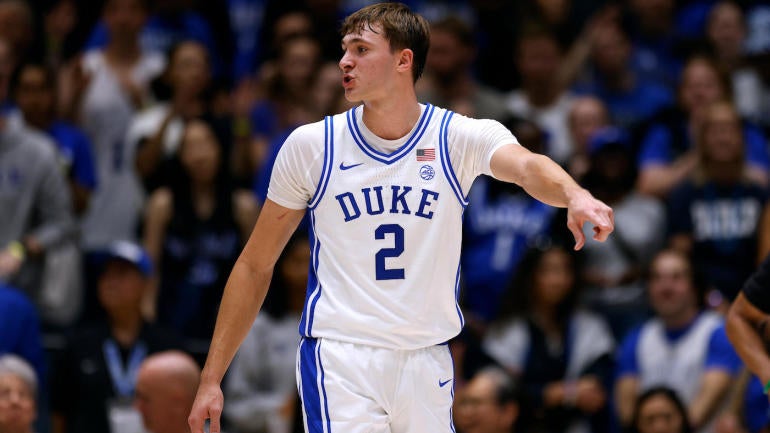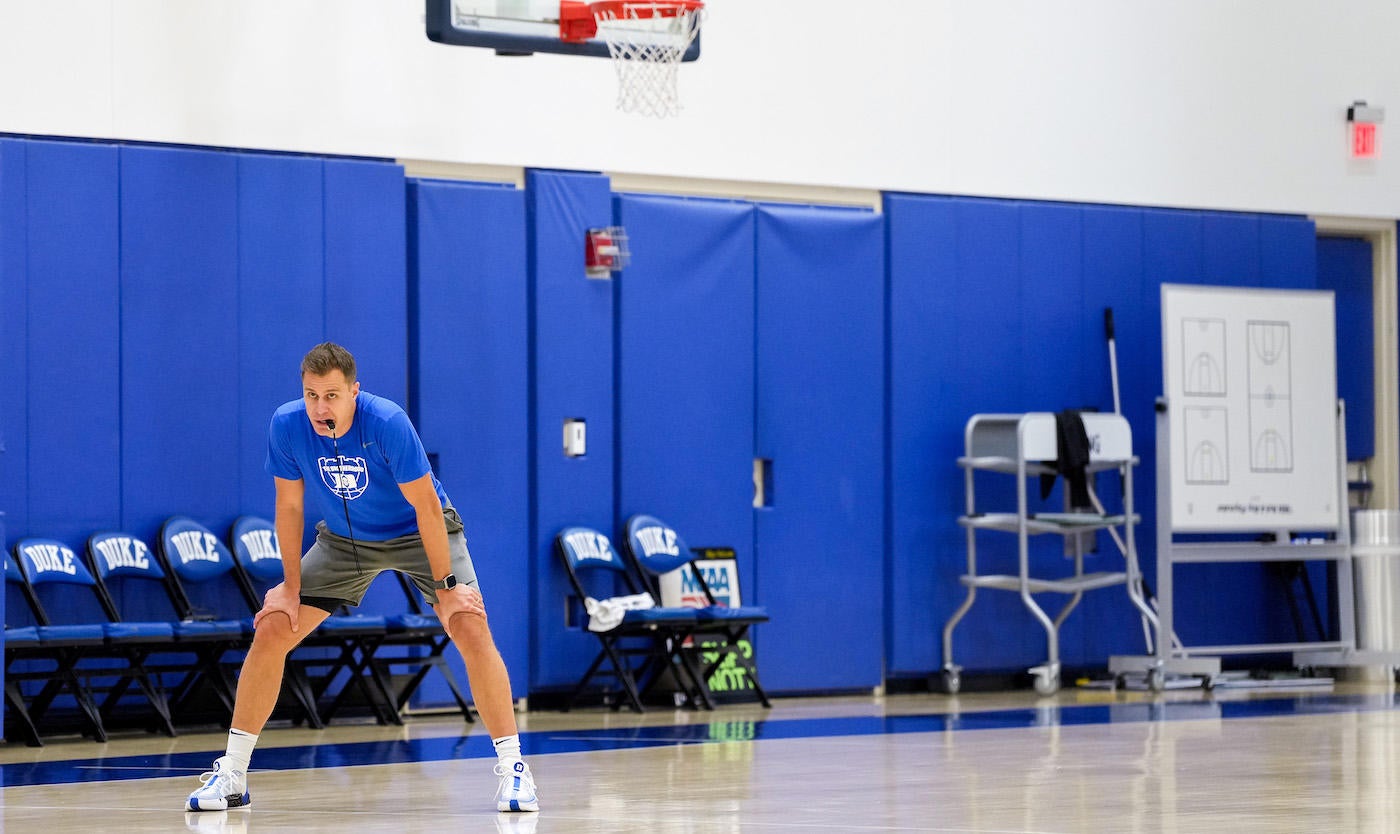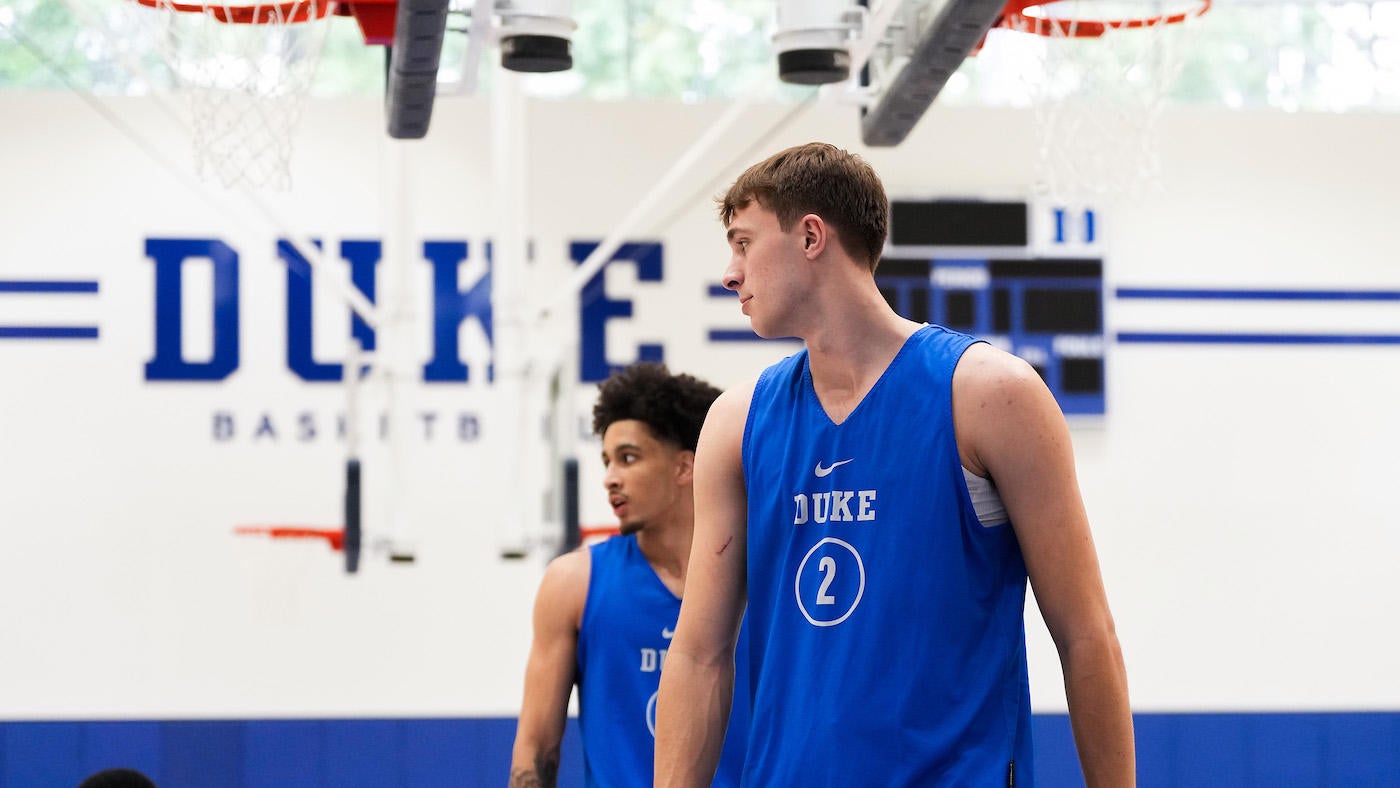DURHAM, N.C. — It’s been more than a decade since he played competitively, but “competitively” is all relative to Jon Scheyer. He’ll tell you he’s still involved in high-stakes on-court competition on a weekly basis. The guy still needs to hoop. Not wants to — needs to.
Inside Duke’s practice facility, just about everyone is a target for Scheyer’s playful but zealous ire. He’ll push it in five-on-five with managers, walk-ons, anyone. Scheyer loves full-court pickup runs that go well over an hour, first to 120 points wins. If bodies are scarce, he’ll sometimes play full-court two-on-two, which sounds like a psychopathic game.

“I have a psychopathic job,” Scheyer’s quick to quip back.
Some assistants, players and support staff are mandated to play when Scheyer wants to lace up. Others — like assistants Jai Lucas and Emmanuel Dildy — have been permanently benched.
“They know that I’ll get pissed at them if they play and they don’t play defense, and I’m not gonna go for that,” Scheyer said with a laugh. “To be honest with you, they’re soft.”
There is no digital documentation, no whiteboard in the facility keeping tally of Scheyer’s conquests, but now that it’s brought up, he kind of likes the idea of having something visible to remind everyone of who’s who and what’s what. Scheyer says he’s only lost one competition of any kind with any player, manager, walk-on or coach since the fall period began. Sophomore Caleb Foster — who is 17 years Scheyer’s junior — managed to beat his coach in a game of one-on-one.
Could it be that the fix is in? Are Scheyer’s underlings merely throwing the games to keep the boss happy?
“What you’re going to hear is that I load the teams up, that I make bad calls. You’re going to hear some BS,” Scheyer said. “That’s not true, OK, but the truth is that I still compete, still know how to play.”
The games are both good-natured but always legitimately competitive. When it comes to competing, Scheyer is not going to take it easy on anyone. At 37 and in his third season running arguably the most high-profile program in college basketball, physically leading by example is still his preferred leadership tactic.
“The more you can be out there and look the part, or at least show them on the floor, I think that’s an advantage that I have,” Scheyer said. “I just think it helps if they see you doing things you’re asking them to do.”
What Scheyer is asking his team to do doesn’t stray far from what Blue Devils fans will be looking for. Is Duke good enough to make the Final Four? To win a national title? Anything less than a No. 1 or 2 seed in the NCAAs — and a minimum of three NCAA Tournament wins — will be judged as a disappointment.
“It’s a big year, absolutely,” Scheyer told CBS Sports. “But I’ll tell you that every year.”
This season is going to be different, though. That constantly competitive environment is a breeding ground but also training for the transition of Duke’s grand unveiling in less than two weeks.

Get ready, because Duke is probably going to be The Biggest Deal in College Basketball again, potentially reaching the stratospheric levels of Zion Williamson and company in 2018-19. Whether the Blue Devils are the best team, top-10 good or an inconsistent curiosity, Scheyer knows this season is going to be evaluated and adjudicated more intensely than his first two.
The reason for that is obvious. Cooper Flagg.
The top-ranked prospect coming into college hoops is, for now, the comfortably projected No. 1 pick in next June’s NBA Draft. Thanks to his preternatural defensive instincts and a smooth all-around game that led to a spike in interest in the Nike summer circuit, Flagg’s reputation the past two years has skyrocketed. A couple of viral clips of his practices with the United States men’s national team this summer caused a genuine stir, the likes of which we rarely see from phenoms prior to enrolling in college. The basketball world is practically salivating for whatever the next five months of Flagg Frenzy will bring.
Scheyer embraces it all; as the coach of Duke, it’s part of the job description. But the formula he’s chosen is going to be tediously tracked. No team in the country is built like the Blue Devils. There are five freshmen on Duke’s roster in addition to Flagg. Since 2016, national championship-winning teams, even schools that made the Final Four, were not freshman-reliant. None of them had a first-year player as their bona fide star, as Flagg is expected by many to be. Even with a deployment of many older players (mostly transfers), what Duke’s doing is pushing against the trend, especially in this final season of COVID bonus-year eligibility. A lot of teams are rostering players 22, 23 and 24 years old. (To that end, Duke has one of them in former Purdue guard Mason Gillis, who is already a dominant vocal presence on the team.)
“I think you win, still, it’s old to me,” Carrawell said. “We love the one-and-dones. They’re good. They’re not gonna win you a national championship. Got to have a good mix of guys, and you got to have some veteran leadership.”
College basketball has gone through an old-man renaissance the past four seasons. Scheyer told me he didn’t plan on having six freshmen, but the rhythm of recruiting his top-ranked 2024 class led to a pile-up. Flagg and Khaman Maluach (the No. 4 player in the Class of 2024) were the last players to commit. They also happened to be uber-talented frontcourt pieces. And no coach in the country is turning down commitments from those two, no matter who else is on the team. So, six freshmen it is. That led Scheyer to recruiting nothing but veterans in the portal after Duke’s NCAA regional final loss to rival NC State prompted a handful of players from last season’s team to transfer.
“It was the most interesting April I’ve ever had,” Scheyer said “But I believe in the makeup of this group more than I could even explain.”
By any objective measure, Scheyer has passed the test through two seasons. His teams won 27 games apiece, including an ACC Tournament championship in Year 1 and an Elite Eight appearance as a No. 4 seed this past March.
Flagg changes the dynamic, however. The anticipation is one thing. The reality of it all — the magnitude — won’t be felt until the season starts, and even then, probably not until Nov. 12 when No. 7 Duke plays No. 23 Kentucky in the Champions Classic. How can Flagg prepare for what awaits? He can’t. When your reputation is as high as his and you choose to play in a Duke uniform and opt into all of that prestige, all of that attention, all of that expectation, these are the things you sign up for. Flagg’s parents, Kelly and Ralph, have encouraged Scheyer and the Duke staff to coach up their son as aggressively as possible. No fluff, no kid gloves. For the family, there is no assumption that Flagg is being promised anything into next week, let alone next June.
“They believe in their son, don’t get me wrong, but they also know he’s got a lot to work on and they wanted him to be in an environment where he’d be pushed, to be coached, to be challenged, to be told no,” Scheyer told CBS Sports. “When you’re a 17-year-old kid like Cooper and you have the world at your fingertips, you’re not told no a lot. And so to be in an environment where you can be told no is key.”
The last freshman that with this much hype coming into college wasn’t even Zion. It’s forgotten by some, but Williamson was ranked lower as a high school recruit than fellow teammates RJ Barrett and Cam Reddish. It wasn’t until after the 2018-19 season began when Zion Mania rapidly spread. The last time a freshman brought this much anticipation heading into a season was probably Kentucky’s Anthony Davis in 2011. Davis, like Flagg, was the No. 1 recruit in his class. Like Flagg, he was anomalously gifted as a shot-blocker and thus became the defensive centerpiece on the only UK team to win a national championship under John Calipari. Flagg is good enough to do the same.
“They kind of have something, a lot of the same intangibles, great teammate, they connect with everybody — that’s really hard to do,” Duke assistant Chris Carrawell said of the Zion/Cooper comparisons. “This dude comes in, he’s been coachable. Zion was coachable. They come in with this, I wouldn’t say aura, but they did.”
“The thing that separates him, I think, is his energy and motor in a practice. He’s the loudest one,” Carrawell added. “Always jumping around and s—. It’s like, it’s this dude’s energy, man, it’s infectious. And so you build it around his talent, but we kind of adjusted and we’ve been building around his intangibles. This dude hates to lose. He’s hardly had a bad practice — he has had a bad practice — but he practices hard and so our guys are feeding on that, and he probably doesn’t even know.”
Scheyer calls Flagg a “one-time guy,” meaning if he doesn’t know something or hasn’t experienced it, he’s good with most everything once he goes through it a first time. A quick struggle, a quicker adjustment. But he still has about two months until he turns 18, so we’ll see if that applies to high-level Division I competition. In order to prepare for the toughest games of his life so far, he still has to hear “no” a lot in between those practice lines.
“His attitude has been incredible. He doesn’t care about attention, he doesn’t care about the hype,” Scheyer said. “He doesn’t care about anything other than being one of the guys. And so he has everybody’s respect instantly because of how hard he works. You can’t deny his ability, enough talent and all that, but you can’t deny his work ethic, and you can’t deny who he is as a teammate. So to me, that’s been the most impressive part.”
There is a specific plan in play as well. Flagg was not made available to be interviewed for this story. Duke has communicated that Flagg will not be doing any one-on-one interviews with the media in the near future. I was told Flagg is trying to blend in and “be one of the guys” as much as he can for as long as he can. He wants to be part of a campus community and live college life in this fertile period … before every minute of every game he plays is tracked and audited. The normalcy he seeks could dissolve as soon as he provides his first draft-reel highlight or MVP-type performance.
Whether that approach winds up making a difference in Flagg’s adaptability to college basketball, nobody knows. Scheyer knows there’s only so much you can rehearse for.
“No matter what, he’s gonna have to go through some of this, he’s gonna have to get into some of these moments and just feel it,” Scheyer said. “There’s gonna be bumps, no doubt, but I think his ability to move on is at a high level.”

“It’s a rare few players where you just kind of let them be,” Duke assistant Jai Lucas said. “He just has an ability to just, you put him on the floor, he’s gonna make something happen. But the one thing to remember is he’s still 17, so it’s still a lot of stuff that’s going to come with 17, he is going to struggle this year. It’s not going to be a perfect year. He’s going to be really good, but he also is going to have some struggles just because of age … and he’s not Zion, where he’s just physically imposing.”
Watching Duke practice, Flagg was hard not to follow over the course of two-plus hours. His energy was consistent, his stamina as good if not better than anyone on the team, and his involvement — verbally, especially — was conspicuous. He looks like a freshman in terms of muscle tone and appearance, but his work ethic and basketball IQ outpace his age.
“I think the best thing we can do is just make it as hard as possible for him in the preseason and push him, challenge him — and he wants all that, “Scheyer said. “So it works really well, being able to have some veterans, being able to have Sion James guard him in practice, Maliq Brown, those kinds of bodies that he’s going to go against, where you adjust as quickly as you can the preseason, even though, no matter what, there’s going to be a growth process you go through when the season starts.”
Flagg could be Zion-esque … or he could be just a pretty good freshman on a talent-laden Duke team that could be as reliant on junior point guard Tyrese Proctor as much as Flagg or any other player. It’s not as buzzy of a talking point, but in watching Duke’s team dynamic in practice, Proctor’s play is probably going to be the barometer for Duke’s consistency.
“He’s a key guy, no question,” Scheyer said. “And his progression is just doing it all the time. You know, he’s shown flashes of doing it. Now it’s time, as a junior, where the competitive spirit that he knows that he needs to take on every play, every play within the play.”
Scheyer told me he threw Proctor “into the deep end” as a freshman. It’s altered his path, but perhaps ultimately for the better. To his credit, he didn’t opt to transfer and didn’t look for an easier way out after a bumpy sophomore year. As the oldest continuous contributor on Duke’s roster, Duke’s staff believes Proctor’s play is as crucial as anyone else, if not moreso.
Scheyer said simplifying the game should be the key to Proctor’s ascendence in his third season. He wants him to hunt his shot and be dialed in all the way on his man-to-man lockdown defense. Set a tone for the team in how he competes.
“Instead of trying to be good at 10 different things, let’s be killer in these three areas, and be that way all the time. And I think we’ll see a big, big jump with him,” Scheyer said. “We’ll have a great year if he does those things.”
The early signs are encouraging. Freshman Kon Knueppel is getting rave reviews from NBA scouts who have watched Duke. Maluach is raw but his physicality and high-end defensive ceiling is incredible. Foster is nearing 100% health. Sion James and Maliq Brown are going to ensure Duke is bigger and more physical this year. There’s a lot of tantalizing potential.
“Been a lot of noise in the gym,” Carrawell said. “These guys bring voices, with even the young guys. … A different energy in the gym.”
Duke’s defense could be top-10 in the country if the team is healthy and everything clicks. But with so many freshmen, this team remains a massive wait-and-see. It’s why Scheyer’s group wasn’t given the benefit of the doubt this October the way it was a year ago, when Duke was the No. 2 team in the preseason. Here, it’s No. 7. Far from being disrespected, but still not a top-tier title favorite heading in with a markedly different roster from just seven months ago.
“I do know I have 10 really good players, and some are on different timelines,” Scheyer said. “We need to coach them right away with an amazing sense of urgency to win.”
Urgency is the word in Durham, in part because half of this roster might not be playing for Duke a year from now, just as it was with last season’s team. When you’ve got the great fortune and glamour of Cooper Flagg, there isn’t a day or a practice or a pickup game to waste. Scheyer has handled one of the toughest jobs in sports well through more than two years of holding it. Now, a different type of tour awaits. This feels bigger, more consequential, like it’s the first major chapter of Scheyer’s coaching life. The 2024-25 season is going to provide more potential, pressure and possibility at Duke than anywhere else.














